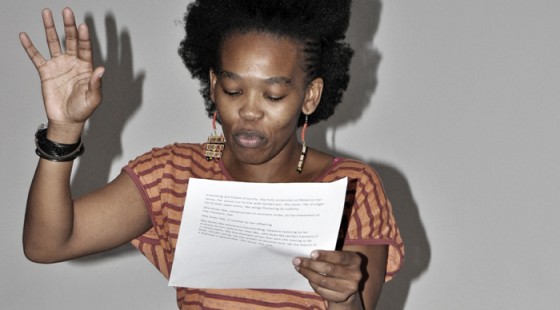Umthi Omnyama presents Khanyisile Mbongwa: Performance Art and Poetry, 17 April 2012, English Department, Arts and Social Sciences Building, Stellenbosch.
FRANCES STROOH

Hailing from Gugulethu, Khanyisile Mbongwa is an established performing artist, dance facilitator and poet. On the poster for this event, she stands beckoning: her hand is poised somewhere between a plea and a provocation. With this image in mind, I take my seat among the small gathering of people in the Yellow Molteno room. It is a humid Tuesday afternoon and the largest part of the audience is made up of academics – relieved at the opportunity to flee from their stifling routines.
The lights are dimmed and the atmosphere in the room becomes dense with expectancy. Mbongwa’s small, upright figure emerges from the back of the room and moves through the audience to face us. The opening verse is a Xhosa poem called “Ngqo-ngqo” that Mbongwa delivers so confidently that it exudes the fact that she is a force to be reckoned with. The poem is unpredictably rhythmic and her articulation of the Xhosa language is enchanting in a way that transcends lexical meaning.
Still in awe of the opening Xhosa verse, I have to admit to a hint of disappointment when Mbongwa discloses that she will mainly be showcasing her English poetry during this performance. The first English poem she performs is one that elaborates on the anguish felt by a woman whose lover deceives her. The element of performance art becomes more prominent when Mbongwa involves two audience members in the reading of her poem. She fixes the poem onto the male student’s back, while positioning a female next to him as “the other girl”. Mbongwa instructs the female student to hum a simple, yet stirring melody that enthrals the entire audience. Her voice is unexpectedly soulful and it underscores the speaker’s feelings of pain and rejection.
Mbongwa bounces back from this rather emotional poem to a rhyme with attitude. The poem is titled “Look from a white boy at varsity” and it addresses one of her experiences concerning race and gender on Stellenbosch campus. This resonates well with her involvement in UrbanScapes, a movement based in Stellenbosch that examines the credo of identity informed by language, race and sex. For this recital, she summons a white male from the audience. She fastens the poem to his shirt and faces him contemptuously while reading it out loud. Haughtily, she reaches the end of the poem:
And he thinks
“Pity she’s black.”
And I think
“Fuck you,
You privileged piece of shit.”
The male flushes deep crimson throughout the recital. He is rendered a mere prop; unable to defend himself he emits a sense of helplessness as he heeds Mbongwa’s attack. Let the “subaltern” speak.
The rest of the poems that are performed continue to elaborate on these themes of race, gender, feminism and love. This includes a poignant, yet sensual poem that explores the Oedipus-notion by recounting a daughter’s sexual attraction to her mother. However, the show seems to lose some momentum towards the end, suggesting that even such powerful themes can become repetitive.
Mbongwa has a particularly interesting language history. She was born to Zulu parents, yet grew up in Xhosa and had all her classes in primary school in Afrikaans. An interesting observation is the fact that she chose to recite her English poems from a page, whereas the poems she composes in her native tongue are performed from memory. This performative difference might suggest that she distances herself from the coloniser’s tongue; that she does not view it as her own, that it cannot express her sincerest sensations.
My only criticism of the show also contains great praise: Khanyisile Mbongwa’s strength remains her Xhosa poetry. The final poem that she recites, “Ubuphixi-phixi”, acts as an affirmation of this claim. The poem is a heart-wrenching relation of her cousin’s death in gangster violence. To a non-Xhosa speaking audience member, her intonation and the way her voice reverberates while performing this poem carries ample meaning to grasp its core. Mbongwa skilfully weaves the poems into accounts of her personal experiences throughout the performance, forming an intricate and colourful tapestry of her life’s journey.
To see more of Mbongwa, look out for the collaborative Xhosa blog Umthi Omnyama (Black Tree) that will be launching in July 2012. The blog seeks to provide a platform for Xhosa writers, thereby promoting the expansion of the literary base of indigenous languages in South Africa – definitely something to look out for, considering the success of Mbongwa’s performance. Umthi Omnyama’s next event will take place at the end of May and will feature Zandisile Mbombo and Luvo Ngxubaza from Kayamandi in a monologue-meets-dance production.
 SLiPStellenbosch Literary Project
SLiPStellenbosch Literary Project
This piece was written by a golden mind, I say.